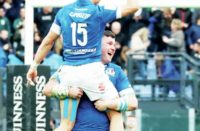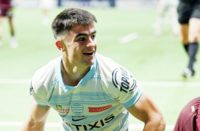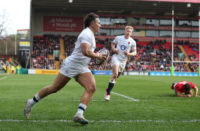 Warren Gatland's credentials as the best coach in Northern Hemisphere rugby, and arguably the best in the world, have been writ large since the 2013 Lions won a series in Australia with virtually zero hours in which to prepare.
Warren Gatland's credentials as the best coach in Northern Hemisphere rugby, and arguably the best in the world, have been writ large since the 2013 Lions won a series in Australia with virtually zero hours in which to prepare.
It was a landmark victory not just for Gatland, but for the Lions – and, hopefully, with the autumn series just around the corner, for the four Home Unions.
A first series victory in 16 years lifts Gatland into the pantheon of great Lions coaches alongside his predecessor, Sir Ian McGeechan, and the legendary coaches of 1971, Carwyn James, and 1974, Syd Millar.
It also gives the Lions gravitas as they look ahead to their New Zealand tour in 2017, whetting the appetite for what should be a galvanising series. Alongside that, the triumph in Australia has also given rugby in the Northern Hemisphere a welcome spring in its step, with the 2015 World Cup now in view.
As for Gatland's place in the modern coaching pyramid, of those still practising only Jake White and Steve Hansen have lifted the big prize that has so far eluded Gatland – the World Cup. However, in terms of length and breadth of achievement, Gatland's is greater.
It starts with a Heineken Cup title (2004) with Wasps as well as three Premiership titles and an Amlin Cup. He has since trumped that by leading Wales to two Six Nations Grand Slams (2008 and 2012), three Championship titles, three Triple Crowns, and a World Cup semi-final in his six-year tenure as head coach.
The addition of a winning Lions series to those laurels has not diminished Gatland's desire to push on. His next mission since returning from a break to his native New Zealand is to win the World Cup for Wales for the first time – and when I interviewed him this week it was at the apex of his agenda.
However, now that a few months have passed since the epic win in Sydney – and the firestorm over Brian O'Driscoll's dropping has burned out – has he had time to savour the Lions success?
“Yes, and on reflection it was special to be part of it. There have not been a huge number of Lions successes, so it is something special not only to win a series, but also to help to preserve their heritage of the Lions.”

Gatland points out also that it was achieved with the odds stacked heavily against his squad. “Something people don't always appreciate is the lack of preparation. You are playing away from home against one of the top three teams in the world, so the odds are against you when you have so little time to bring a team together.
“The Lions ethos is about touring, and to make yourselves accessible to the public – and that brings added pressures to those of national touring teams, who concentrate purely on winning.”
Having become part of the weave of Lions history, Gatland says that if he is still in a position to pitch for the head coach's role in New Zealand 2017, he would do so happily.
“I really enjoyed the experience, and if it comes around again in four years time, if it's possible, I would love to be involved. A Lions tour is unique, and when I got to New Zealand friends were telling me that the interest over there was greater watching the Lions in Australia than it was the All Blacks playing France. It's the atmosphere, the colour and the singing, generated by the fans that really gets people going. But I'm back to the day job, and if Wales do well in the next four years, hopefully, that puts you in with a chance.”
That brings the focus back to the autumn series, and in particular onto an Australia side which is about to embark on a Grand Slam tour of the Home Unions in the wake of a sharp decline – which started with their loss to the Lions.
Does Gatland think that the Lions sent Australia into a tailspin, or were they already headed that way?
“Maybe a bit of both. There were signs of their off-field discipline problems during the Lions series, but I thought they would have regrouped sooner under their new coach, Ewen McKenzie.”
However, Gatland knows the recuperative powers of the Wallabies well enough, and he says there are clear signs of improvement which England, who play them first, and Wales, who play them last, should heed.
“The thing about Australian teams is that they can be written off but then surprise you. Many thought Argentina would beat the Wallabies at home because, after the Lions, Australia looked like a team which had had the confidence knocked out of them. In their last game against Argentina they went back to moving the ball about, and were not quite so conservative. Confidence is always very important to Australian sides, and now they have a bit of it back.”
On the subject of confidence, the suggestion by Andy Farrell, his Lions defence coach, that England are better placed than any other team going into the 2015 World Cup, elicits a light-hearted response from Gatland.
“I think they're the second best team in the world! Andy's going to say that, isn't he? We all learned a lot from the Lions in terms of self-belief, but what is true is that England have more strength in depth than anyone. If they lose a player they have three or four to come in, whereas if we lose Jamie Roberts and Jonathan Davies there is Scott Williams to come in, but after that we struggle.”

He adds, “England's focus is definitely on the World Cup, and being at home with their huge resources they will be incredibly difficult opposition.”
However, Gatland says that all the Home Unions have benefitted from the 2013 Lions, with Wales in the vanguard.
“Apart from Adam Jones, Gethin Jenkins and Mike Phillips, Wales have got young guys who will be around not just for the next World Cup but until 2019. So we should take huge confidence out of that.
“The England players were great to work with on the Lions tour, and they also have a young squad. The Irish are a pretty experienced group, and although the Scots representation was not large, someone like Stuart Hogg could be special going forward, and it would also be good to see Richie Gray kick on into a leadership role.
“There are a big positives from a Lions tour in terms of learning, and in terms of sharing experience so that all the Home Unions can take it to the next level. In the Northern Hemisphere I have sometimes felt we are too protective, whereas they share more freely in the Southern Hemisphere, and it's to our detriment.”
Gatland admits, however, that he has a job on his hands with Wales to mitigate the physical and mental demands placed on his players by the Lions tour.
“What I need to do is assess every player individually and plan how to get the best out of them. The history of Lions tours is that France usually win the Six Nations the following season, so I have to make sure our players are as mentally fresh as they can be.”
He also makes it clear that the Six Nations is still paramount. “The autumn series is important, but the Six Nations is our bread and butter, so we need to be ready to go then. I may have to rest a couple, because although it looks okay at the moment the effects of a Lions tour can make it a long season and mount up. We don't want to get caught in the Six Nations with our pants down.
“It will be tough with England and Ireland away. England want to put down a marker and, of course, there's the added motive and incentive for the Irish and their fans from the Lions tour. However, having the three blue teams at home is good for us. The Six Nations is all about momentum, because it is such a short tournament.”
As for the autumn, Gatland says that he will miss playing New Zealand, the world champions, and the team still setting the pace at international level.
“I would love to be playing them. When I took the job I said to (WRU chief executive) Roger Lewis, ‘Go out and get the best in the world, because the only way we get better is playing against the best'. We learn from adversity – that's when your biggest learning takes place.”
However, he says he still has plenty on his plate. “It is still a very tough autumn, and with South Africa, Argentina and Australia as opponents it should be exciting and compelling. We have done well in the Six Nations, but not as well in the autumn, so I'm saying let's put down a marker.
“South Africa will be very tough, and they would rather play us last, so hopefully we can catch them a bit cold – but they are always tough and physical. Argentina become a really tough nut to crack if you get in an arm wrestle, and they have a good set piece and don't miss many tackles. Tonga, hopefully, will give us the chance to give our less experienced players a chance.”
Gatland says that his biggest conundrum, as with all pro coaches, is when to introduce young players at elite level: “You know with young players that you will go through a bit of pain. For example, in Dan Lydiate's first start against Australia he was a bit off the pace, and like a rabbit in the headlights at times. But we knew he would come through.
“It is often a no-win situation developing young players because you have to give them the exposure, but if you lose pressure mounts and you will cop flak.
“In that sense the game is getting more like football. Sometimes you are afraid to put young players in because you know they are going to hurt you – you know that it will be painful before they develop and come good.”
Coming good at the right time is top priority with two years to go until the World Cup, and Gatland has proved a master when it comes to getting his teams to peak.
Gatland is also an expert at accentuating positives and minimising negatives, and that hallmark is there as he assesses the prospect of having hosts England and Australia in the same pool as Wales.
“It's the pool of death – but I'm quite happy that we are playing both those games at Twickenham. Being at home puts pressure on England, and Wales have had success there too. Sometimes the Millennium Stadium can be a disadvantage when you play against Southern Hemisphere sides, because it is the best stadium in the world and a stage that they love playing on.
“Whoever comes out of it should be well set to go further in the competition – and as we have seen sometimes with the All Blacks, they have struggled because they have not been competition-hardened by the knockout stage.”
As for Wales winning the World Cup, with Gatland steering the course you would be mad to dismiss their chances.
One Comment
Leave a Comment
You must be logged in to post a comment.



























Pingback: poppenhuis